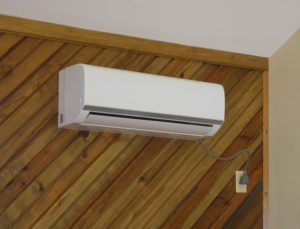Regular maintenance of your commercial central air conditioning unit is vital for many reasons. Not only will upkeep and repairs keep your system running efficiently for longer—thereby saving you money—but it will also help ensure a healthier, more productive, and more comfortable work environment for your employees or building tenants. In this post, we will strive to answer some of the biggest questions about commercial air conditioning unit maintenance.
How often should I schedule maintenance for my commercial central air conditioning unit?
 Perhaps the first question that most commercial building owners/managers ask about air conditioning maintenance is how regularly it needs to happen. The answer can vary a bit depending on the building and the unit. For instance, if you have an older unit, you are going to want to have it inspected and fixed up more frequently than you would with a brand-new piece of equipment. Your HVAC technician should be able to advise you on the overall condition of your unit and the best-practice maintenance schedule for that unit.
Perhaps the first question that most commercial building owners/managers ask about air conditioning maintenance is how regularly it needs to happen. The answer can vary a bit depending on the building and the unit. For instance, if you have an older unit, you are going to want to have it inspected and fixed up more frequently than you would with a brand-new piece of equipment. Your HVAC technician should be able to advise you on the overall condition of your unit and the best-practice maintenance schedule for that unit.
In general, your HVAC system is going to demand at least two maintenance sessions each year: one in the spring and one in the summer. The spring session should focus specifically on the air conditioning unit, as the summer will be the high-demand season for that piece of equipment. In the fall, you’ll call your HVAC technician again to check your heating system and make sure it is ready for the colder winter months.
Is maintenance worthwhile for my unit?
In the vast majority of cases, maintenance should be a no-brainer for your air conditioning unit. Parts wear out over time, and there are only two ways you are going to know about those failures. Option one is that you call in a technician regularly to inspect your unit, identify issues, and provide the necessary upkeep to keep the unit operating reliably. Option two is that you wait until your unit breaks down entirely to call for a repair. The first option gives you gapless air conditioning performance even through the peak of summer; the latter options means downtime and a potentially very hot building. Also, fixing issues before they result in a breakdown typically costs markedly less than full-scale post-breakdown repairs.
With all this said, there may be situations where maintaining or repairing your air conditioning unit just doesn’t make sense anymore. Eventually, every piece of HVAC equipment outlives its usable lifespan. If you have an older unit that needs lots of upkeep to keep going, you will need to weigh the upfront expenses of replacing the unit with the inconvenience (and smaller but still notable costs) of more frequent checkups and maintenance. Newer, more state-of-the-art units offer significant advantages for energy efficiency and performance. Chat with your HVAC technician to get a sense of how much life your unit might have left—and whether now is the right time to retire it.
What does air conditioning unit maintenance involve?
A technician will do several things when carrying out an air conditioning maintenance call. These steps may include:
- Checking refrigerant levels
- Inspecting the unit for refrigerant leaks
- Checking seals and fittings to make sure they are secure
- Clean the coils
- Replace filters and worn-out parts
- Check belts for wear
- Test the thermostat for accuracy
- Measure airflow through system/coils
- Inspect electric terminals
In addition, remember that your ducts—while not directly a part of your air conditioning unit—are crucial components of your air conditioning system as a whole. Dirty ducts impede airflow and affect air quality throughout your building. Having them cleaned regularly—ideally as part of your annual air conditioning inspection and maintenance call—will help preserve the performance of your system.
What other questions should I ask my HVAC contractor?
There is a learning curve to HVAC management for a large commercial building. Obviously, you want your system to be able to handle temperature control for your building in an effective, reliable, and efficient manner. However, the fact is that there are a lot of components to an HVAC system, and therefore, a lot of variables that can affect the overall performance of the system. Chatting with your HVAC contractor and asking a few questions can teach you more about your system and more about the things you can do to keep it running well.
For a list of starter questions, read our blog about “What You Should Ask Your Commercial Air Conditioning Company.”
Call Your HVAC Technician Today
Maybe it’s been a while since you last had a commercial HVAC technician in your building to inspect your commercial central air conditioning unit. Alternatively, perhaps you are having issues with temperature consistency or interior air quality throughout your building. In either case, you can find the solution you need by calling your trusted HVAC technician and scheduling an inspection and maintenance session. Getting that inspection on the calendar—and then working to put together an HVAC maintenance calendar for going forward—will do a lot to ensure premium performance from your system.

